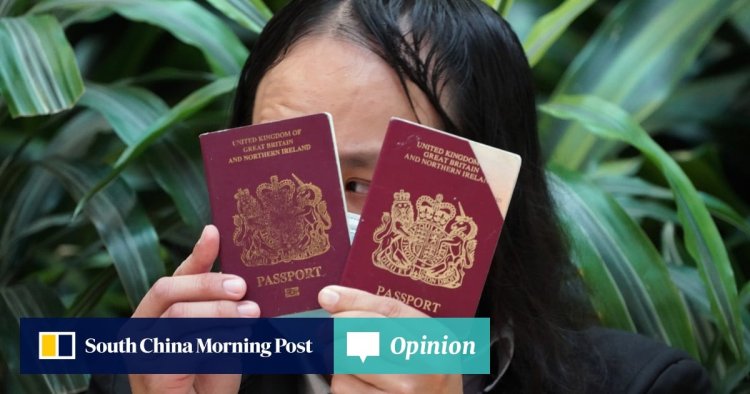Worried about your MPF account? Blame the British for BN(O) confusion
2023.04.24 08:15More than 30 years ago, two European countries with a history as colonial powers were planning their departure from Asia. A discussion of the different approaches they adopted would normally be of interest only to historians, but some of the decisions by one of them are still having serious consequences today.For example, the recent discussions over the ability of British National (Overseas) passport holders to claim their Mandatory Provident Fund (MPF) savings early is a direct result of the United Kingdom’s decisions across many years about what constitutes British nationality and who is entitled to it.But before we delve too deeply into the British system, consider Portugal’s handling of Macau. It was easy to persuade Lisbon to cease administering Macau: the Portuguese government had already tried to hand it back to China without fuss. The preparatory discussions went smoothly, as did the formal handover in 1999.Before leaving, as a mark of respect for their centurie


More than 30 years ago, two European countries with a history as colonial powers were planning their departure from Asia. A discussion of the different approaches they adopted would normally be of interest only to historians, but some of the decisions by one of them are still having serious consequences today.
For example, the recent discussions over the ability of British National (Overseas) passport holders to claim their Mandatory Provident Fund (MPF) savings early is a direct result of the United Kingdom’s decisions across many years about what constitutes British nationality and who is entitled to it.
But before we delve too deeply into the British system, consider Portugal’s handling of Macau. It was easy to persuade Lisbon to cease administering Macau: the Portuguese government had already tried to hand it back to China without fuss. The preparatory discussions went smoothly, as did the formal handover in 1999.
Before leaving, as a mark of respect for their centuries in charge, Portugal offered a full Portuguese passport to Macau citizens who wanted one. This honourable gesture immediately produced some anomalies.
As citizens of a European Union member country, Macau citizens could go to live and work in the United Kingdom, and their children qualified for home student status and thus paid lower fees at British universities. Hong Kong “British” citizens, on the other hand, could not freely emigrate there, and their children had to pay the higher fees charged to foreign students.
The British approach was completely different. For most of the two years China and the UK spent negotiating Hong Kong’s return, Britain tried to retain a role in the city’s future governance. Only when Beijing made clear this was a complete non-starter did serious talks begin.
Moreover, Britain began making changes to its nationality laws as far back as 1981 to ensure there would not be a mass exodus from Hong Kong either in 1997 or in the event of any emergency. Before that time, British citizens could travel freely to the different British territories.
A Hong Kong British passport holder could easily migrate to the UK in the 1950s and ’60s to live and work there – as many Hongkongers did, including my stepfather – while a Brit arriving here was free to work without a special visa, as I did. The introduction of British Dependent Territories passports limited this freedom to the right to reside in the particular territory which issued it.
This arrangement grew into the BN(O) status. You were not British, and the Hong Kong passport gave you no right of abode.
Revealed: Britain’s ‘disgraceful’ efforts to deny nationality to Hongkongers
Instead of a comprehensive safety net, in the run-up to 1997 the British introduced a special scheme for Hong Kong whereby 50,000 heads of household and their dependents would be given full British nationality upon application and after a case-by-case vetting by a committee. Some Hongkongers did qualify via this route, though many applications failed, including some from locally engaged military personnel.
There have been further developments in more recent times. Specifically, after the enactment of the National Security Law, Britain felt obliged to make a further gesture. It still could not bring itself to adopt the Portuguese model, instead offering BN(O) passport holders the right to enter the UK and stay there on the condition they were entirely self-supporting and placed no burden on public finances.
After five years, they could apply to convert their stay into right of abode and, after a further year, full British nationality. No justification has ever been offered for this long pre-qualification period. It derives entirely from internal British political calculations.
It is only after travelling this long route that we can examine the current MPF situation in its full context. The MPF scheme is basically simple: the employer and employee each pay in every month until the employee reaches the age of 65. They can then draw on the accumulated funds.
Residents can apply for early withdrawal from the MPF upon permanent departure from Hong Kong. Where the applicant has already secured right of abode in another country or the circumstances of their visa are such that grant of such a right on arrival is automatic and guaranteed, early withdrawal is routinely approved.
Banks are doing BN(O)ers in UK a favour by withholding their MPF pensions
Beneficiaries of the latest BN(O) scheme have launched a campaign to argue that the same right should be accorded to them. The UK-based organisation Hong Kong Watch has issued various statements supporting the idea to the Financial Times and other media outlets.
These articles imply the pensions are somehow at risk, but this is not true. When the individuals concerned reach the age of 65, or when they secure right of abode in Britain, the payments will be made.
The BN(O) scheme as promulgated does not secure that right. Individuals could fail to reach the full residency qualification or their applications could be rejected.
Think it couldn’t happen? In the 1990s, one of my tasks in the government was to deal with the fallout from just such a rejection. Unstated is the undeniable truth that the British government could solve the problem at a stroke by converting all the BN(O) cases to full British nationality.
What's Your Reaction?






















